Triple is an industrial building in the centre of Madrid that has been transformed into a healthy building using sustainable architectural methods. It is the first eco-carbon neutral co-working and event space in the centre of the Spanish capital, a 'sustainable oasis' as the people who designed it prefer to call it. And it has been strategically designed to promote wellbeing in the workplace, with a particular focus on physical, emotional and psychosocial health. Triple is not only a building that respects human health, but also the health of the planet.
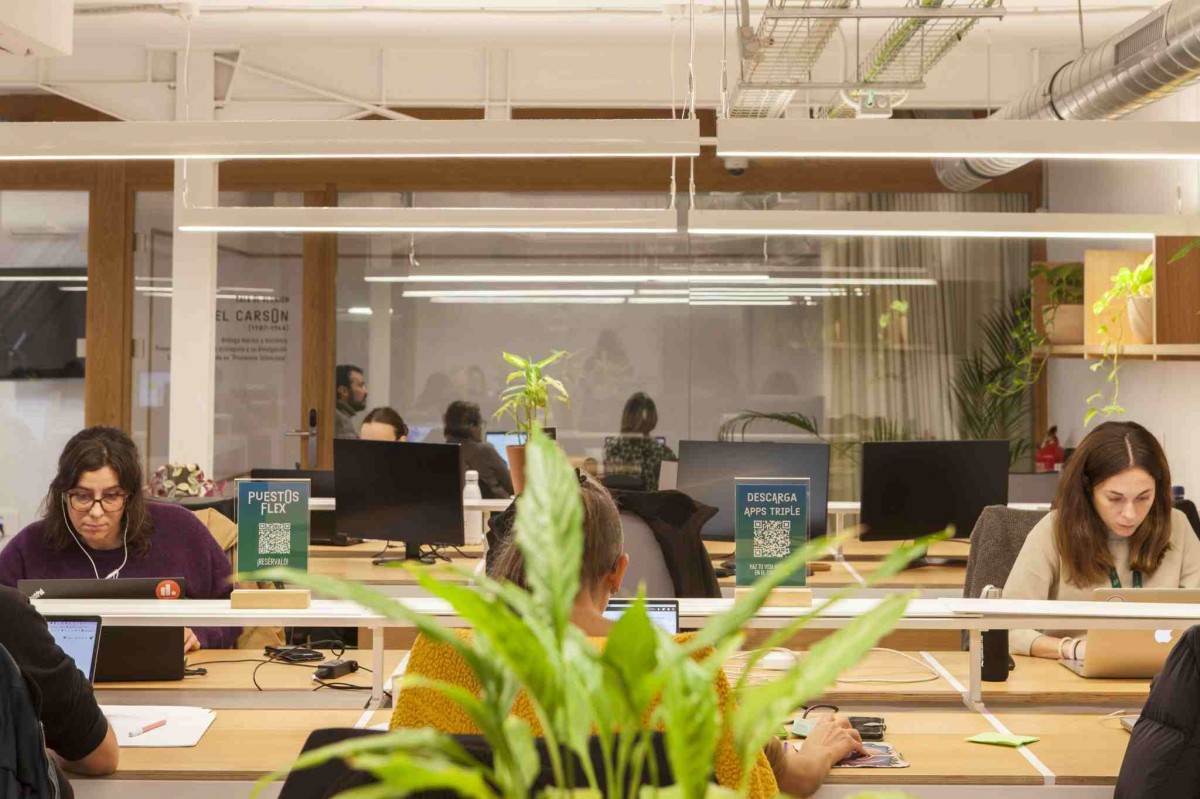 We met Raquel Traba Galisteo, the CEO of Triple, and she told us more about this outstanding case study, but also about the culture of combining human well-being and greening in a creative co-working space.
We met Raquel Traba Galisteo, the CEO of Triple, and she told us more about this outstanding case study, but also about the culture of combining human well-being and greening in a creative co-working space.
We asked Raquel how she and her collaborators came up with this idea and she simply replied, "It's in our DNA. I mean, we are ecologists. We came from this knowledge of this ecosystem. It was very natural for us. We couldn't do it any other way. So it was like that or not".
Triple is a 600 square metre building that was renovated in 2020 by sAtt, an ecological architecture studio. During the renovation, the building was measured using Ecómetro's Life Cycle Analysis tool and emissions were offset by reforestation. Passive house standards were followed, and panels of wood fibre and recycled cotton textiles were used for insulation. These and other techniques have resulted in energy savings of 90%, placing Triple in the Nearly Zero Energy Buildings (NZEB) category. In addition, 100% of the electricity used in the building comes from renewable sources.
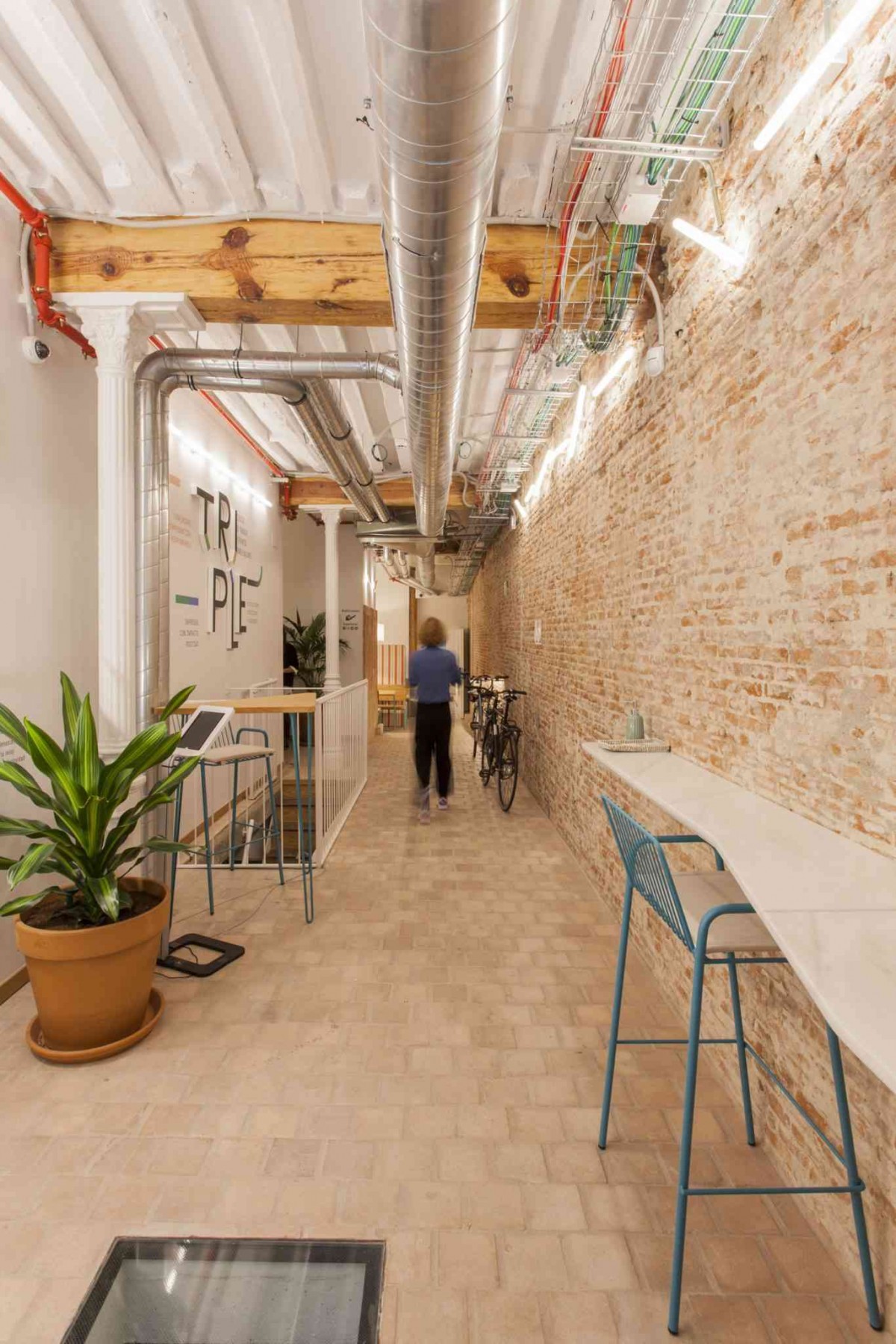 The building's old materials have been retained, but the new ones have also been carefully selected for their impact and biocompatibility. For example, FSC-certified wood, fired clay or ecological vegetable paints and oils have been used, which are non-toxic and free of harmful chemical substances.
The building's old materials have been retained, but the new ones have also been carefully selected for their impact and biocompatibility. For example, FSC-certified wood, fired clay or ecological vegetable paints and oils have been used, which are non-toxic and free of harmful chemical substances.
The design of the building has taken into account the reduction of electromagnetic pollution, so the furniture has been designed to be connected to the ground dissipating all static electricity to the ground. The air has been purified by mechanical ventilation, which brings in air from outside that has been previously filtered and cleaned. The presence of vegetation is intense in the building, balancing the relative humidity and increasing the level of well-being, and the lighting is designed with people in mind. It simulates natural light and manages circadian cycles. The different workspace environments are zoned and insulated with recycled engineered panels for acoustic comfort.
"During the renovation we had to make so many decisions about everything," says Raquel Traba Galisteo. "We had to have an eye on every single thing. For example, to buy this table instead of the other one because the glue used in the other one is not ecological... so many detailed decisions we had to make. Fortunately, we had the support of this architecture studio, which has been pioneering green architecture in Spain for more than 20 years. One of the things that made it a bit difficult for us, because we wanted to trade responsibly, was the suppliers of the materials. We rejected the big suppliers like Amazon and looked for materials from local suppliers. If we couldn't find it with a local supplier, we simply changed the material”.
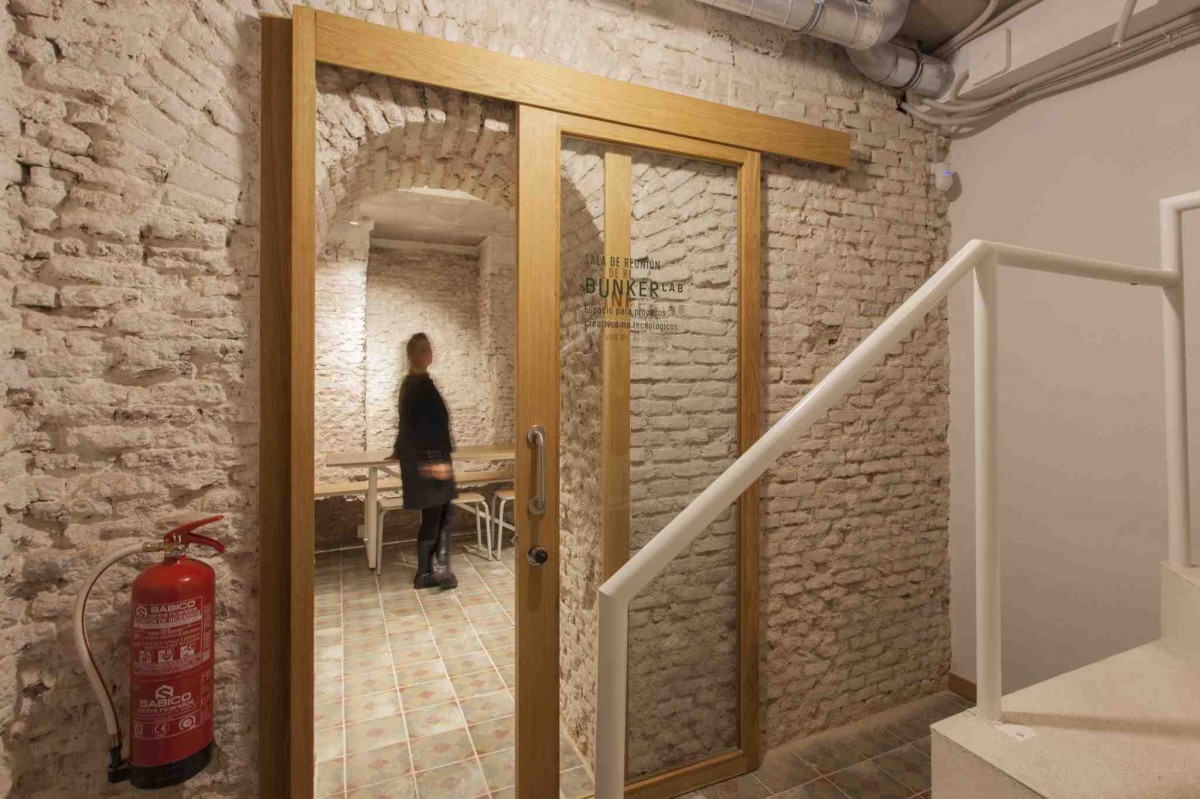 According to Raquel, the insistence on a substantially green and human- and planet-friendly renovation of the building increased the total cost by about 30%. The investment was financed only by private capital and bank loans. When asked if it was worth the effort, Raquel says yes. "It is a 600 square metre building with very low energy consumption. So there is a significant reduction in running costs. Maybe not so much in one year, but in the long term, in 20 years, it is worth it. In addition, it seems that in three years' time, because of European regulations, no office, no building, no company will be able to make a choice other than eco or something very close to eco renovation”.
According to Raquel, the insistence on a substantially green and human- and planet-friendly renovation of the building increased the total cost by about 30%. The investment was financed only by private capital and bank loans. When asked if it was worth the effort, Raquel says yes. "It is a 600 square metre building with very low energy consumption. So there is a significant reduction in running costs. Maybe not so much in one year, but in the long term, in 20 years, it is worth it. In addition, it seems that in three years' time, because of European regulations, no office, no building, no company will be able to make a choice other than eco or something very close to eco renovation”.
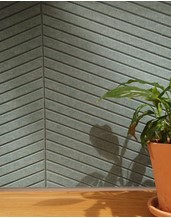 In addition to creating an ecological and humane working environment, Triple's managers have tried to create a community of people in this co-working space who share similar visions and concerns. "We are like a family," says Raquel Traba Galisteo. "We organise meetings, we do yoga together, we have aperitifs sometimes and we start talking in a very friendly atmosphere. People get to know each other and in a very short time they make friends. They also meet outside the room. If someone goes for a coffee, they are likely to start talking to someone else. It is a very comfortable and relaxed environment.
In addition to creating an ecological and humane working environment, Triple's managers have tried to create a community of people in this co-working space who share similar visions and concerns. "We are like a family," says Raquel Traba Galisteo. "We organise meetings, we do yoga together, we have aperitifs sometimes and we start talking in a very friendly atmosphere. People get to know each other and in a very short time they make friends. They also meet outside the room. If someone goes for a coffee, they are likely to start talking to someone else. It is a very comfortable and relaxed environment.
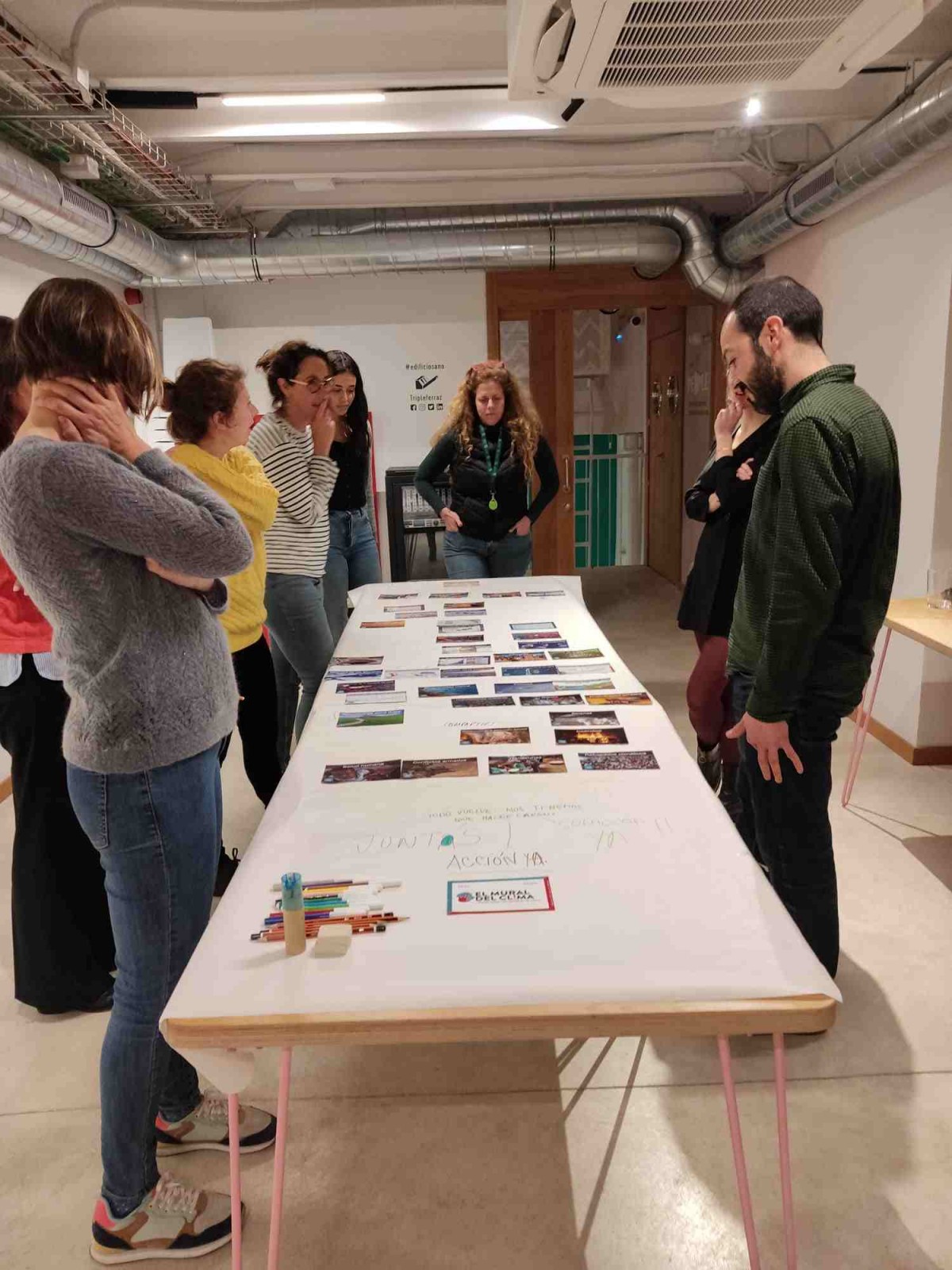 As Raquel describes it, the building accommodates 55 people a day in open-plan workspaces on three floors. "There are a lot of architects, maybe because the place is curated and beautiful. People who consult. There is a journalist from France who works on the quality of the oceans. People who do different things, but all linked by the ecological idea," concludes Triple's CEO.
As Raquel describes it, the building accommodates 55 people a day in open-plan workspaces on three floors. "There are a lot of architects, maybe because the place is curated and beautiful. People who consult. There is a journalist from France who works on the quality of the oceans. People who do different things, but all linked by the ecological idea," concludes Triple's CEO.
When asked if people appreciate working in a healthy building, Raquel says: "People feel it. When you're in a place like this, at the end of the day you're not tired because of the lighting, because you don't smell chemicals, because there's no electromagnetic pollution. All these intangible things that people don't see most of the time help them to feel well. People see that it's nice, they like it, but they don't dig deeper. But when you ask them at the end of the day how their eyes are, for example, they say 'I'm not tired' and that's true”.
Backround
Raquel has a law degree, an MBA and has been an entrepreneur for 25 years. She has worked in different sectors, always with a social impact. She has worked with women, with LGBTQ+ collectives, with ecologists, she has represented immigrants and refugees. "Everything is connected," says Raquel, "and because you want to be surrounded by this kind of people, you try to create the conditions for a large community to be created, in line with your inner self”.
--
Photo of Raquel credit: Ilias Maroutsis
Photo of Triple: Triple Ferraz








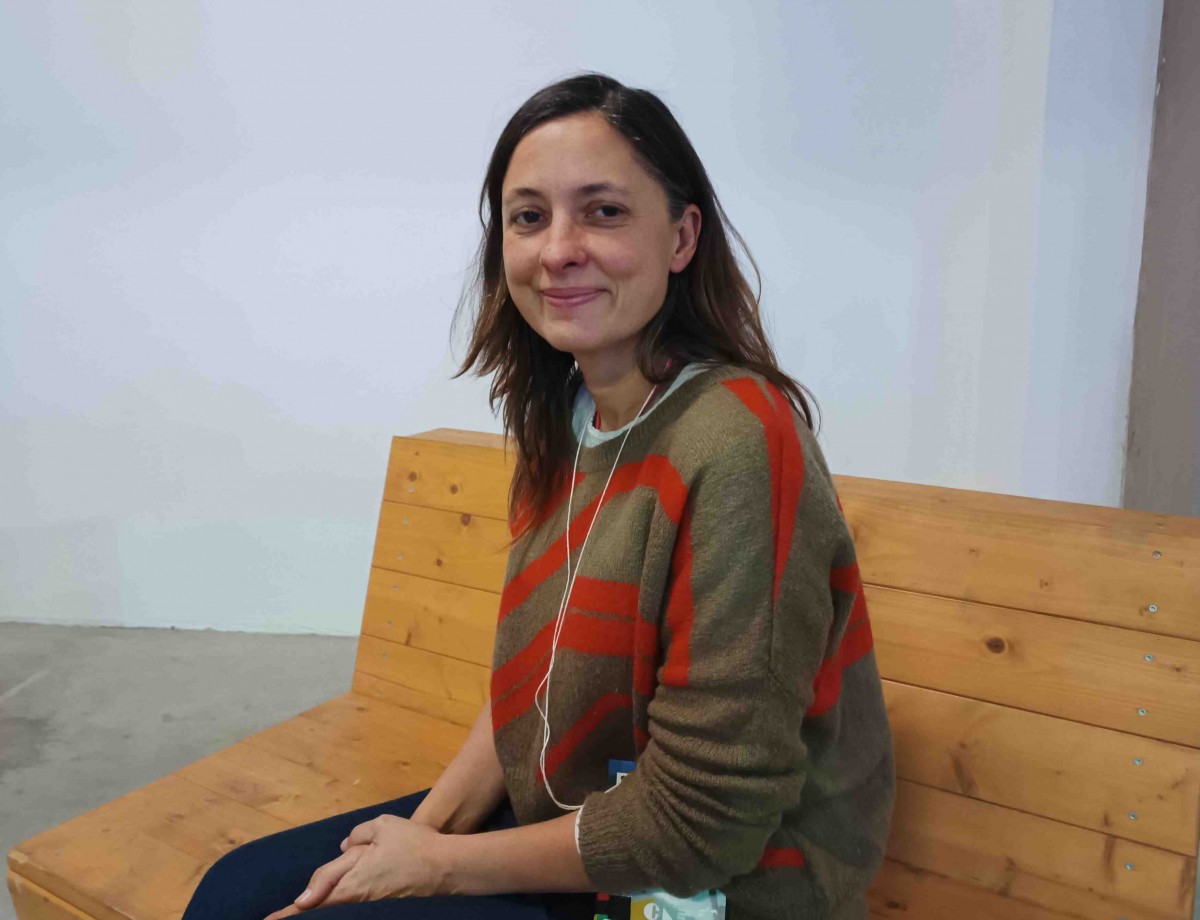
 We met Raquel Traba Galisteo, the CEO of Triple, and she told us more about this outstanding case study, but also about the culture of combining human well-being and greening in a creative co-working space.
We met Raquel Traba Galisteo, the CEO of Triple, and she told us more about this outstanding case study, but also about the culture of combining human well-being and greening in a creative co-working space.  The building's old materials have been retained, but the new ones have also been carefully selected for their impact and biocompatibility. For example, FSC-certified wood, fired clay or ecological vegetable paints and oils have been used, which are non-toxic and free of harmful chemical substances.
The building's old materials have been retained, but the new ones have also been carefully selected for their impact and biocompatibility. For example, FSC-certified wood, fired clay or ecological vegetable paints and oils have been used, which are non-toxic and free of harmful chemical substances. According to Raquel, the insistence on a substantially green and human- and planet-friendly renovation of the building increased the total cost by about 30%. The investment was financed only by private capital and bank loans. When asked if it was worth the effort, Raquel says yes. "It is a 600 square metre building with very low energy consumption. So there is a significant reduction in running costs. Maybe not so much in one year, but in the long term, in 20 years, it is worth it. In addition, it seems that in three years' time, because of European regulations, no office, no building, no company will be able to make a choice other than eco or something very close to eco renovation”.
According to Raquel, the insistence on a substantially green and human- and planet-friendly renovation of the building increased the total cost by about 30%. The investment was financed only by private capital and bank loans. When asked if it was worth the effort, Raquel says yes. "It is a 600 square metre building with very low energy consumption. So there is a significant reduction in running costs. Maybe not so much in one year, but in the long term, in 20 years, it is worth it. In addition, it seems that in three years' time, because of European regulations, no office, no building, no company will be able to make a choice other than eco or something very close to eco renovation”. In addition to creating an ecological and humane working environment, Triple's managers have tried to create a community of people in this co-working space who share similar visions and concerns. "We are like a family," says Raquel Traba Galisteo. "We organise meetings, we do yoga together, we have aperitifs sometimes and we start talking in a very friendly atmosphere. People get to know each other and in a very short time they make friends. They also meet outside the room. If someone goes for a coffee, they are likely to start talking to someone else. It is a very comfortable and relaxed environment.
In addition to creating an ecological and humane working environment, Triple's managers have tried to create a community of people in this co-working space who share similar visions and concerns. "We are like a family," says Raquel Traba Galisteo. "We organise meetings, we do yoga together, we have aperitifs sometimes and we start talking in a very friendly atmosphere. People get to know each other and in a very short time they make friends. They also meet outside the room. If someone goes for a coffee, they are likely to start talking to someone else. It is a very comfortable and relaxed environment.  As Raquel describes it, the building accommodates 55 people a day in open-plan workspaces on three floors. "There are a lot of architects, maybe because the place is curated and beautiful. People who consult. There is a journalist from France who works on the quality of the oceans. People who do different things, but all linked by the ecological idea," concludes Triple's CEO.
As Raquel describes it, the building accommodates 55 people a day in open-plan workspaces on three floors. "There are a lot of architects, maybe because the place is curated and beautiful. People who consult. There is a journalist from France who works on the quality of the oceans. People who do different things, but all linked by the ecological idea," concludes Triple's CEO.